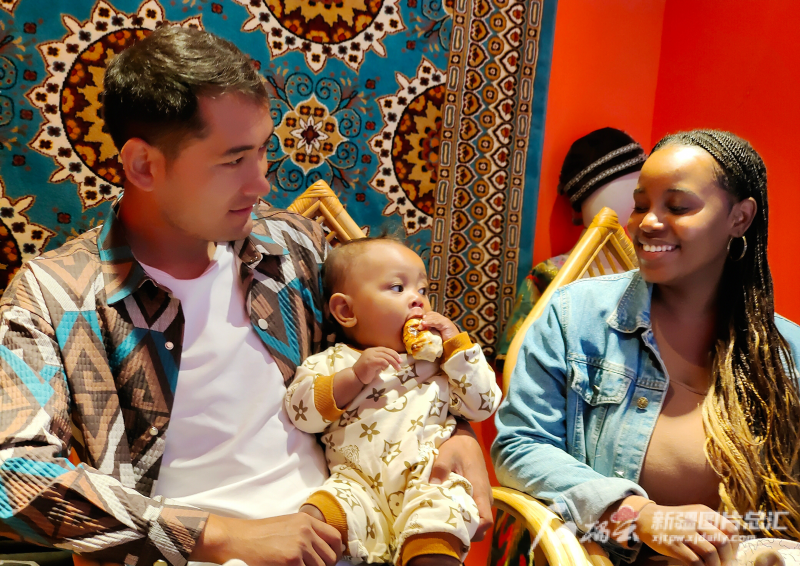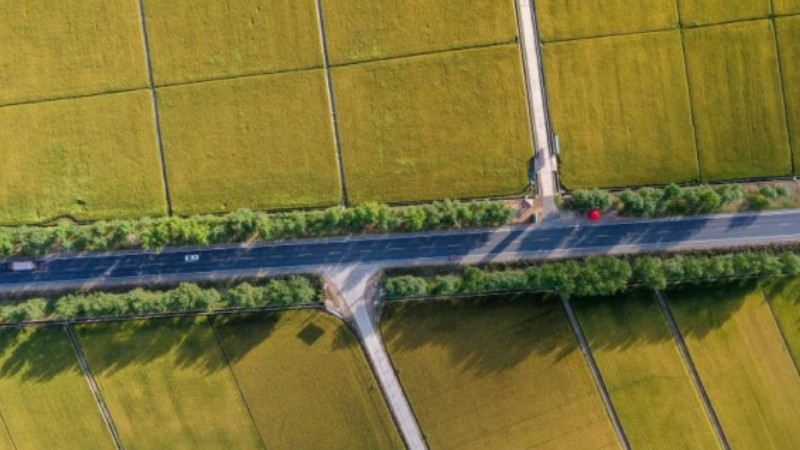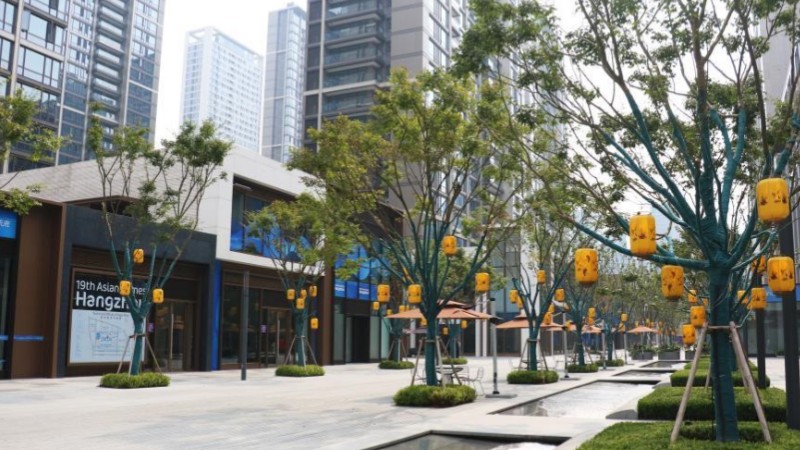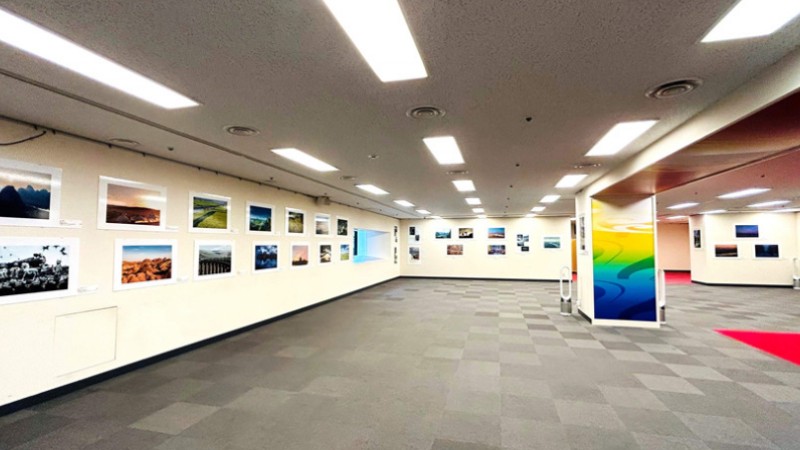Road of Prosperity: A Sino-African love story brews in Kashgar, NW China's Xinjiang
On Aug. 24, 2023, the Dili and Diya Cafe in the historic city of Kashgar was filled with customers and tourists seeking their first autumn coffee. The cafe has recently gained online attention for the romance of its owners, a Chinese-African couple, drawing tourists from across China eager to experience the venue firsthand.
Above the cafe's entrance, visitors can see a wooden plank bearing the carved names of the couple. Adjacent to this, on a blue door, hangs a wedding photo. The photo reveals that the bride, Hadiya, is from Zanzibar, Tanzania, while the groom, Dilxat Tursun, was born in Kashgar.
Kashgar, once a significant stop on the ancient Silk Road, has retained its distinctive architecture, garments, music and dance, which continue to attract tourists.

A photo shows the family of three. (Photo by Shiliuyun-Xinjiang Daily/Fan Qiongyan)
Kashgar's rich color palette, especially the hues of the dried fruits on display, caught Hadiya's eye. Their cafe mirrors these vibrant tones. On a recent day, Hadiya was busy grinding coffee as Dilxat, cradling their 8-month-old son, watched over her.
After finishing work, the couple sat down to share their story. With their young son busily nibbling on a samosa (a roasted stuffed bun) in their arms, Hadiya remarked, "His teeth haven't all grown yet, and he loves to eat samosas. He just can’t help himself." She also noted her own fondness for Xinjiang cuisine.
Over the past decade, due to the Belt and Road Initiative, there has been an uptick in international exchanges. This has brought many students, including Hadiya, from nations along the Belt and Road to study in China.
Ten years ago, Dilxat, who was studying at Fuzhou University, met Hadiya, who was studying at Fujian Medical University. Their campuses were just across the street from one another. Near the school, there was a restaurant that employed a chef from Xinjiang, where they both went every week to eat Xinjiang food. They gradually fell in love.
"He appeared resplendent, exhibited an exceptional command of the English language, and showcased remarkable prowess in basketball,” Hadiya reminisced. “During my school days, I used to avidly observe his captivating performances on the basketball court."
In 2017, after Dilxat finished his studies and with Hadiya having a year left, he returned to Kashgar to introduce Hadiya to his family. Though initially surprised, his parents quickly gave their blessing. When he mentioned he wanted to rejoin Hadiya in Fujian, his father sold 20 sacks of wheat to help finance the move. "This heartfelt gesture from my family truly exemplified their unwavering support," Dilxat recalled.
After completing her studies, Hadiya had to return to Tanzania for a year-long internship before acquiring medical certification. Throughout this period, several prospective matches were proposed to her, but Hadiya declined their advances. In October 2019, with her medical certification in hand, she broached the topic of marrying Dilxat in China with her family. "None of our relatives had ever experienced a cross-country marriage. Thus, the esteemed elders approached this matter with the utmost caution and discernment," Hadiya said.
Ultimately, the family's warm sentiments toward China played a part in supporting her decision.
Hadiya pointed out significant Chinese contributions in her homeland, such as the prominent "Chairman Mao Stadium," the Tanzania-Zambia railway built with Chinese assistance, and a water supply project in Mwanza developed under the Belt and Road Initiative and jointly built by China and Africa.
"The Tanzania-Zambia Railway is commonly referred to as the 'Freedom Trail' and the 'Friendship Road' within our nation,” she said. “My elders attest that China provided invaluable assistance in constructing this railway amidst exceptionally challenging circumstances." The railway remains a testament to the longstanding friendship between China and Tanzania, symbolized further by monuments honoring Chinese aid workers who died during its construction.
After the proposal of the Belt and Road Initiative, China-Tanzania economic cooperation has been further strengthened. China has embarked on a series of infrastructure projects in Tanzania, resulting in a rising number of Chinese professionals. Simultaneously, an increasing number of Tanzanians have chosen to pursue opportunities for work, study and residence in China.
After over two years of working in Fuzhou and with Hadiya six months pregnant, the couple made the decision to resign and relocate to Kashgar City.
Following the birth of their son, they opted to remain in Kashgar to launch a business venture. "So many people come to Kashgar to start a business, travel, find business opportunities, and find inspiration. Why should we leave?" In March of this year, they opened their cafe in the heart of Kashgar's old town.
As the cafe gained popularity, their love story garnered attention online. While some patrons arrive seeking authentic African coffee, others are eager to meet the couple at the heart of this Chinese-African love story.
With the momentum of the Belt and Road Initiative, countless individuals are realizing their aspirations. The family, as beneficiaries, are determined to grasp this moment and bring their dreams to life.
The cafe's clientele is steadily increasing. Dilxat, besides managing the cafe, has entered the e-commerce realm. He's become an agent for African coffee beans, selling them in Kashgar, and is also exporting Kashgar's distinctive products to Africa.
Source: TIANSHANNET
Photos
Copyright © 2023 People's Daily Online. All Rights Reserved.









